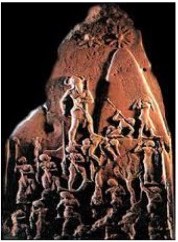was a shadow of what it had been centuries earlier: many cities had been abandoned, others had shrunk in size, and the total settled population was probably not much more than a hundred thousand. Settlement was concentrated in cities along the coastal plain and along major trade routes. The central and northern hill country which would later become the biblical kingdom of Israel was only sparsely inhabited, and Jerusalem was a Canaanite city-state recognizing Egyptian suzerainty. Politically and culturally, Egypt was dominant; each Canaanite city had its own ruler, but was often at odds with its neighbors, appealing to Egypt to adjudicate differences. The city-state system broke down during the Late Bronze Age, and Canaanite culture was then gradually absorbed into that of the Philistines, Phoenicians and Israelites. The process was gradual and a strong Egyptian presence continued into the 12th century BCE.

Archeological Periods in Canaan
Stone Age: c. 8500-4300 BC
Copper Age: 4300-3300 BC
Bronze Age: 3300-1200 BC
Early Bronze Age = 3300-2300 BC
Middle Bronze Age = 2300-1550 BC
Late Bronze Age = 1550-1200 BC
Iron Age: 1200-586 BC
Babylonian Period: 586-539 BC
Persian Period: 539-332 BC
Hellenistic Period: 332-63 BC
Roman Period: 63 BC-324 AD
Deconstructing the Walls of Jericho - Ze'ev Herzog
This is what archaeologists have learned from their excavations in the Land of Israel: the Israelites were never in Egypt, did not wander in the desert, did not conquer the land in a military campaign and did not pass it on to the 12 tribes of Israel. Perhaps even harder to swallow is the fact that the united monarchy of David and Solomon, which is described by the Bible as a regional power, was at most a small tribal kingdom. And it will come as an unpleasant shock to many that the God of Israel, Jehovah, had a female consort (Asherah) and that the early Israelite religion adopted monotheism only in the waning period of the monarchy and not at Mount Sinai. Most of those who are engaged in scientific work in the interlocking spheres of the Bible, archaeology and the history of the Jewish people - and who once went into the field looking for proof to corroborate the Bible story - now agree that the historic events relating to the stages of the Jewish people's emergence are radically different from what that story tells.
~~~~~~~
